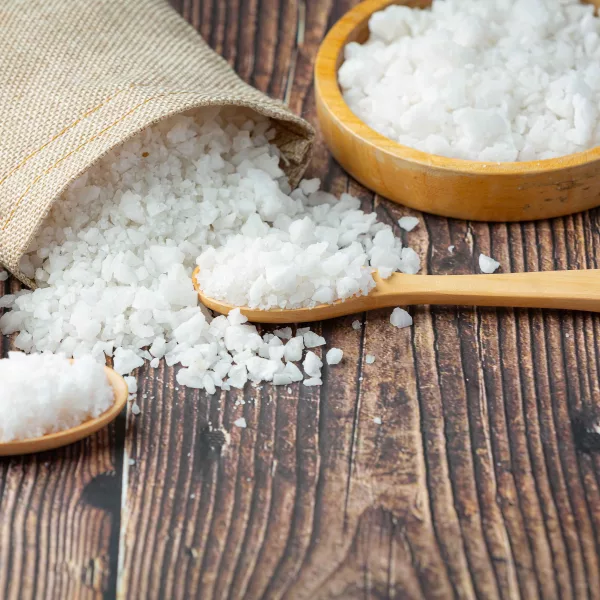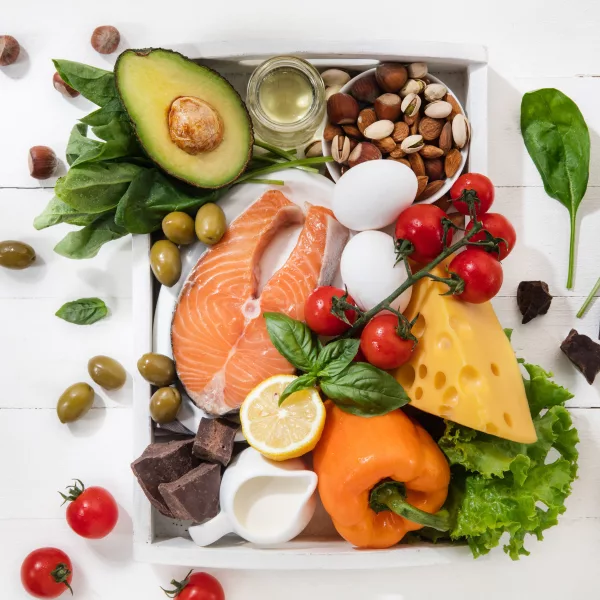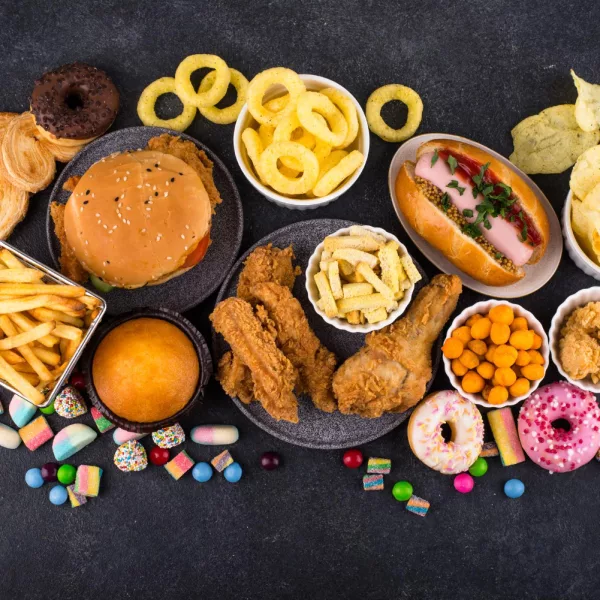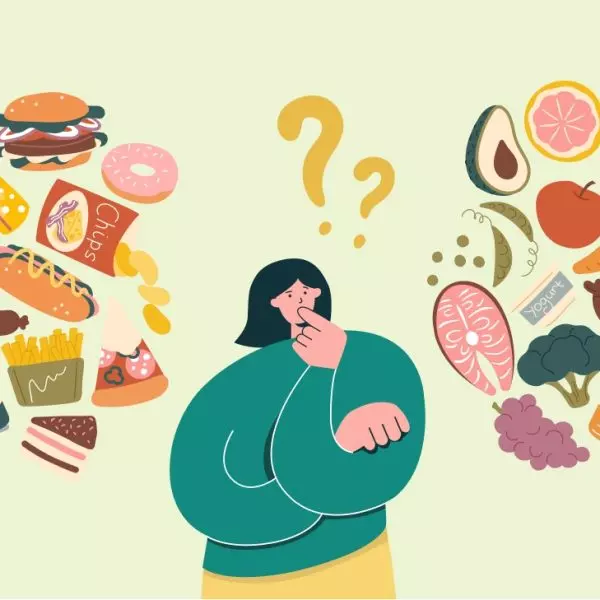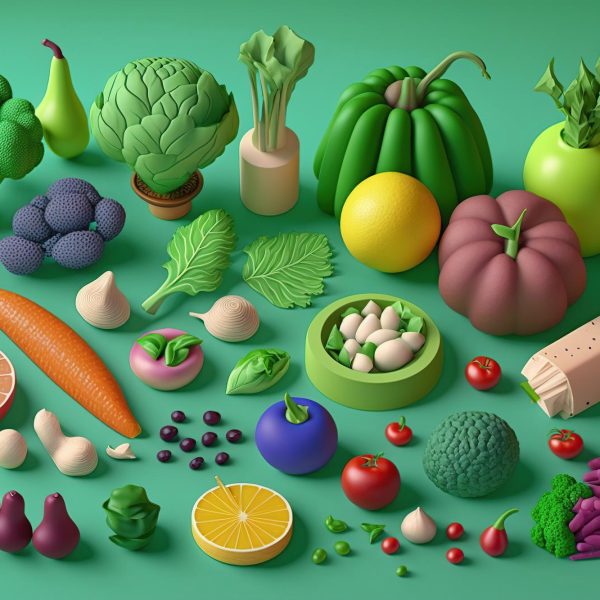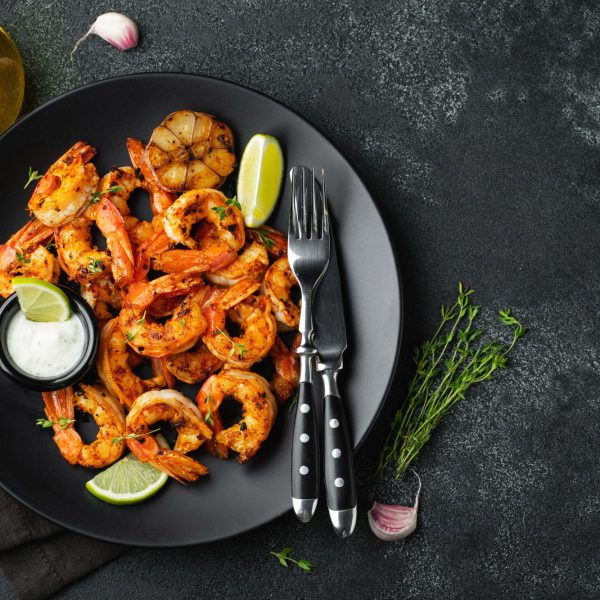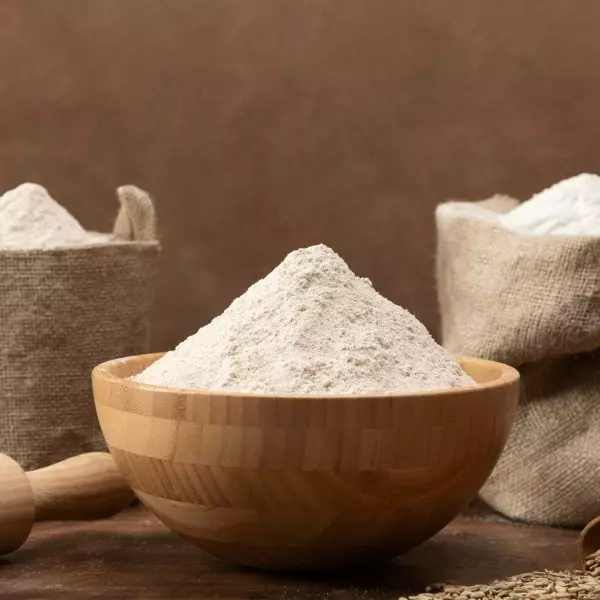Salt is an important part of our diet because it’s our main source of sodium, a mineral necessary for our body, but like carbs, they can be both friend and foe. So what does sodium do for the body? How much salt is too much per day? Which high-sodium foods should you avoid? We’ve done the research to provide all the answers. By the end of this guide, the fourth of our Foundations of Food series, we will unpack everything about salt - you’ll have a clearer understanding of what sodium is, and how to incorporate it into your diet in a way that benefits your health.
What is salt and why do you need it?
Salt is the most common way we consume sodium in our diet, so much so that ‘salt’ and ‘sodium’ are terms that are used interchangeably. Sodium is a vital mineral that plays a key role in several bodily functions, including:
Fluid Balance: It helps maintain the right balance of fluids inside and outside cells, ensuring proper hydration and maintaining your blood pressure.
Nerve Function: Sodium is crucial for transmitting nerve impulses and regulating muscle contractions, including those in the heart.
pH Balance: It keeps the body's pH levels in check by controlling the levels of acids and bases in the blood.
Nutrient Absorption: It's essential for the absorption of nutrients like glucose and amino acids in the intestines.
Sources of salt in our diet
Historically, salt is used to preserve food because it helps prevent bacterial growth, which leads to food getting spoiled. Today, however, salt is practically in all of our foods. Sodium naturally occurs in many foods, including fruits, vegetables, dairy products, and meat, but it’s especially common in high doses in processed foods like bread, cured meats, condiments, and even sweets, where it’s used to add flavor.
Types of salt & their health differences
When it comes to salt, most people think of standard table salt, but there are several different types of salt, each with its unique health benefits and differences.
Table Salt: This is the most common type of salt - and it’s usually fortified with iodine, a nutrient that is important for thyroid health. However, table salt is also highly processed which strips it of beneficial trace minerals found in less-processed salts. It also contains additives, such as anti-caking agents. While they are generally deemed safe, some people may be sensitive to them.
Sea Salt: It contains trace minerals, such as magnesium, potassium, and calcium, that are not found in table salt. However, the mineral content of sea salt can vary depending on where it is harvested, so it is not always a reliable source of these nutrients.
Himalayan Pink Salt: Himalayan pink salt is less processed than table salt, has a high mineral content, and does not contain additives. Some people believe that Himalayan pink salt is healthier than table salt but no scientific evidence supports this claim.
Kosher Salt: Kosher salt is free of additives but lacks the iodine often found in table salt. It is less dense, so a teaspoon of kosher salt contains less sodium. However, its low density makes it easy to overuse, leading to excessive sodium intake.
How salt impacts your health
Salt is an essential mineral that the body needs to function properly. However, consuming too much or too little salt can have negative effects on your health.
Too much salt in your diet can lead to:
High Blood Pressure, is a major risk factor for heart disease, stroke, and kidney problems. This occurs because salt causes the body to retain water, increasing the volume of blood and putting extra strain on the heart and blood vessels.
Kidney Issues. The kidneys play a vital role in regulating sodium levels in the body. When salt levels are too high, the kidneys have to work harder to excrete excess sodium, which can lead to kidney damage over time.
More fluid retention, causes bloating, weight gain, and swollen ankles. This can be particularly problematic for individuals with heart or kidney issues.
While everyone benefits from cutting down salt, certain groups are at higher risk of complications:
People with High Blood Pressure or Kidney disease: Excessive sodium raises blood pressure, which is a risk factor for heart health and stroke. The kidneys process sodium, so people with chronic kidney disease are more susceptible to the negative effects of high sodium intake.
People with Heart Disease: High sodium intake can exacerbate heart disease by increasing blood pressure and fluid retention, which can lead to complications like heart failure and stroke.
Pregnant women: Excess sodium during pregnancy increases the odds of high blood pressure and preeclampsia, harming both mother and baby. Lowering sodium intake promotes a healthy pregnancy.
Older Adults: They face a higher likelihood of high blood pressure and other health issues that worsen with high sodium intake. Reducing sodium helps maintain overall health and lowers age-related health risks.
On the other hand, too little salt can also impact your health. Low sodium levels in your body can lead to a condition called hyponatremia. This is usually caused by an excess of water in your body which dilutes your body’s sodium levels. You might notice this happening when you exercise on a hot day or go for a long run. Both water and sodium are lost through sweating, but if you’re only drinking water to replenish yourself, your sodium levels might get too diluted - causing mild to moderate symptoms like muscle cramps, headaches, and fatigue. In severe cases, it can lead to mental confusion and seizures. Hyponatremia can also be caused if you have an underlying medical condition (such as liver or kidney disease), taking certain medications or diuretics, or binge drinking.
How much salt should you have per day?
The recommended daily intake of sodium varies depending on age, sex, and overall health. According to the National Institute of Nutrition (NIN) in India, the intake of salt should not be more than 6g per day (one teaspoon). Consuming more than 8g of salt per day heightens the risk of hypertension and other health problems.
How to reduce salt/sodium intake
Most of us consume much more salt than we should - mostly because of our diet. Research shows that salt consumption varies from under 5g to 30g of salt per day in different states with around 40% of the population consuming approximately 10g of salt in a day - which is well above the recommended intake.
It’s important to be mindful of our choices to reduce sodium intake, learn more about sources of sodium in our diet, and choose lower-sodium options whenever possible. Here are some tips for reducing sodium intake:
Choose fresh, whole foods: Fresh fruits, vegetables, and unprocessed meats tend to be lower in sodium than processed foods.
Read nutrition labels: Check the nutrition labels on packaged foods to determine the sodium content. Look for foods that are labeled "low sodium" or "sodium-free."
Limit processed foods: Processed foods, such as canned soups, frozen dinners, and packaged snacks, tend to be high in sodium. Limiting these foods can help reduce sodium intake.
Use salt sparingly: Use salt sparingly when cooking and avoid adding salt to foods at the table.
Be mindful of condiments and sauces: Many condiments and sauces, such as ketchup, soy sauce, and salad dressings, are high in sodium. Choose lower-sodium options or use them sparingly.
Choose lower-sodium options: Look for lower-sodium versions of foods, such as reduced-sodium canned soups and low-sodium bread.
Cook at home: Cooking at home allows you to control the amount of sodium in your meals.
Use herbs and spices: Use herbs and spices to add flavor to foods instead of sodium-based products.
Common questions about salt answered
Is salt healthy or unhealthy?Salt is a necessary mineral for bodily functions, but excessive intake can lead to health issues such as high blood pressure. It's important to consume salt in moderation and opt for less processed varieties when possible.
Which foods are high in sodium?Foods high in sodium include processed meats, canned soups, and fast food. Reading labels and choosing low-sodium options can help reduce your intake.
Which high-sodium foods should I avoid?Processed foods like canned soups, chips, and processed meats tend to be high in sodium and should be limited. Opting for fresh or minimally processed foods is a healthier choice.
Which salt is good for health in India?While Himalayan or sea salt is often marketed as healthier than table salt because of its mineral content, research shows that the trace amounts that are found in these salts are unlikely to have any significant health benefits. Regular table salt in India is fortified with iodine, an important element for thyroid health, and can help reduce anemia, which is especially common in Indian women.
What is more important to consider is volume. Coarser salt like sea salt or Himalayan salt are likely to contain less sodium in 1 teaspoon than finely ground table salt, so it’s important to moderate the volume of salt you use in your cooking, depending on which type of salt you’re using.
Does rinsing canned food reduce sodium?Rinsing canned foods under running water for a few minutes can reduce sodium levels by up to 41%. However, it's important to note that this method doesn't remove all sodium.
How do you fix low sodium levels?Low sodium levels, known as hyponatremia, can be treated by addressing the underlying cause. In some cases, increasing sodium intake through diet or supplements may be necessary.
Why do I crave salty food?Cravings for salty foods can be due to several factors such as dehydration, chronic stress, electrolyte imbalances, or simply habit. Listening to your body's cues and choosing healthier salty snacks like nuts or olives can help manage cravings.
What salt is good for high blood pressure?Reducing sodium intake from all sources, including salt, is important for managing high blood pressure. Using alternatives like herbs, spices, or low-sodium blends can help flavor food without adding sodium.
Does salt increase weight?Excessive salt intake can lead to water retention, causing temporary weight gain. However, long-term weight gain is not directly caused by salt but rather by overall calorie intake and lifestyle factors.
Takeaway
Sodium is an essential nutrient that plays a crucial role in various bodily functions. However, consuming too much sodium can seriously impact your health, putting you at risk of high blood pressure, heart disease, and kidney disease. It is important to be mindful of the sodium content in foods and to choose lower-sodium options whenever possible. By making small changes to your diet, you can reduce your sodium intake and improve your overall health.
Read more



